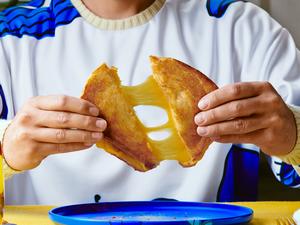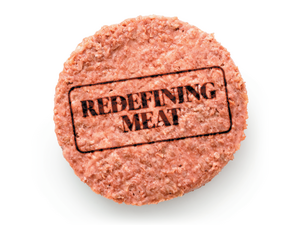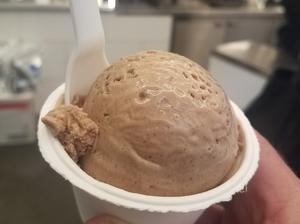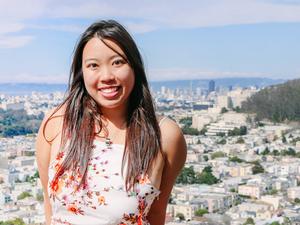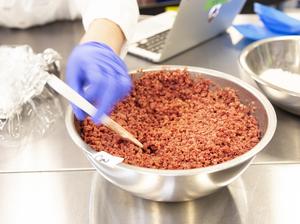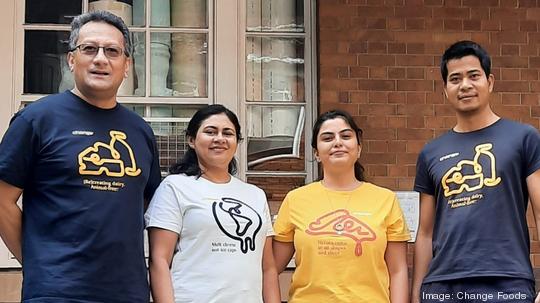
Imagine taking a bite of a sharp cheddar cheese.
Now imagine that the cheese doesn't come from animal milk but from an artificial substance created in a lab to contain the key ingredients used to make cheese.
That's what Palo Alto-based Change Foods Inc. is working on. In its labs, the company has created molecular twins of the proteins used to form cheese. The result is so like the real thing that those with dairy allergies will be allergic to Change Foods' cheese too, said Irina Gerry, the company's chief marketing officer.
"On a molecule-by-molecule basis, it's the exact same as you get from an animal ... except we skip the cow," Gerry said.
Change Foods makes its dairy-free artificial cheese from a substance it creates through fermentation. Bioengineered microorganisms are locked in a tank with nutrients and produce a kind of artificial milk. That substance contains whey and casein proteins that are identical to the ones found in real milk. The company then uses that dairy-free milk to make its cheeses in a similar fashion to the way traditional cheese are made.
Many companies are working on substitutes for meat and other animal products. Livestock has a huge environmental impact, and consuming too much red meat or dairy products can be unhealthy. Meat and dairy substitutes are typically meant to address both concerns.
Founded in 2020 by sustainable food executive David Bucca and molecular biologist Junior Te’o, Change Foods focused on cheese because the product's environmental footprint is second only to red meat. It takes ten pounds of milk to create just one pound of cheese, Gerry said.
While there are some plant-based artificial cheeses on the market, they often don't taste much like the real thing. That's how Change Foods is trying to set itself apart. Despite not using cows, the startup's product is much more like traditional cheese than are plant-based ones.
"Nobody likes cheese. People love cheese. And giving that up is not something that people want to do," Gerry said. "There's a great opportunity to deliver a product that's going to stand up to those expectations."
- Company: Change Foods
- Headquarters: Palo Alto
- CEO: David Bucca
- Year founded: 2020
- Number of employees: 9 full-time
- Website: changefoods.com
The startup is still in the development phase
Change Foods, which has raised $3.1 million from investors including Plug and Play Ventures and Jeff Dean, a Google senior vice president, is still developing its cheese substitute. It's in the process of moving its research-and-development operations to the BioCube labs in South San Jose. The startup, which has nine employees and closed a $2.1 million seed-funding round in June, according to PitchBook Data, plans to start selling its cheese by the end of 2023.
"It's a new category: it's different from plant-based, and it's different from animal-based foods," Gerry said. "While the process is quite revolutionary and breakthrough, the product is actually incredibly familiar."
Change Foods has a few competitors, including Berkeley-based Perfect Day Inc.; Berlin-based LegenDairy Foods GmbH, which does business as Formo; and Those Vegan Cowboys from Belgium. Gerry believes it stands out from the pack due to its early focus on marketing and manufacturing.
Another thing going for Change Foods is that its team has experience in the industry. Gerry herself helped oversee Danone S.A.'s launch of So Delicious, a collection of dairy-free milk and cheese substitutes, and the company's Silk brand of plant-based milk replacements. Chief Operating Officer Luis Espinoza previously worked at Eat Just Inc., a developer of plant-based alternatives to egg products, and Amy’s Kitchen, a producer of organic foods.
Change Foods' process is building on previous efforts that used bioengineering to create a replacement for rennet, a key ingredient in cheesemaking that's traditionally derived from slaughtered calves, Gerry said.
"In many ways, this technology is the next step in cheese making," Gerry said. "We’ve taken out the calf from the milk, and now we’re taking out the cow."
